Unit 9 Have you ever been to a museum? Section A 3a-3c课件(共24张PPT)2023-2024学年人教版英语八年级下册
文档属性
| 名称 | Unit 9 Have you ever been to a museum? Section A 3a-3c课件(共24张PPT)2023-2024学年人教版英语八年级下册 | 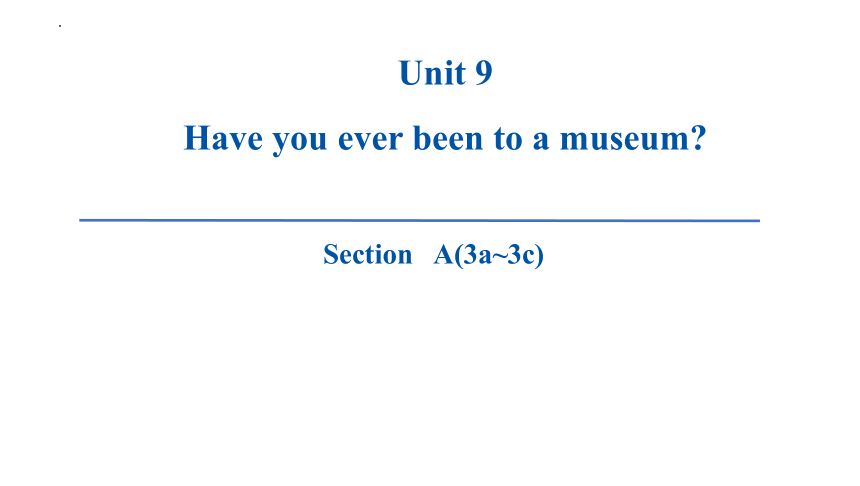 | |
| 格式 | pptx | ||
| 文件大小 | 1.8MB | ||
| 资源类型 | 教案 | ||
| 版本资源 | 人教新目标(Go for it)版 | ||
| 科目 | 英语 | ||
| 更新时间 | 2024-05-16 22:28:02 | ||
图片预览

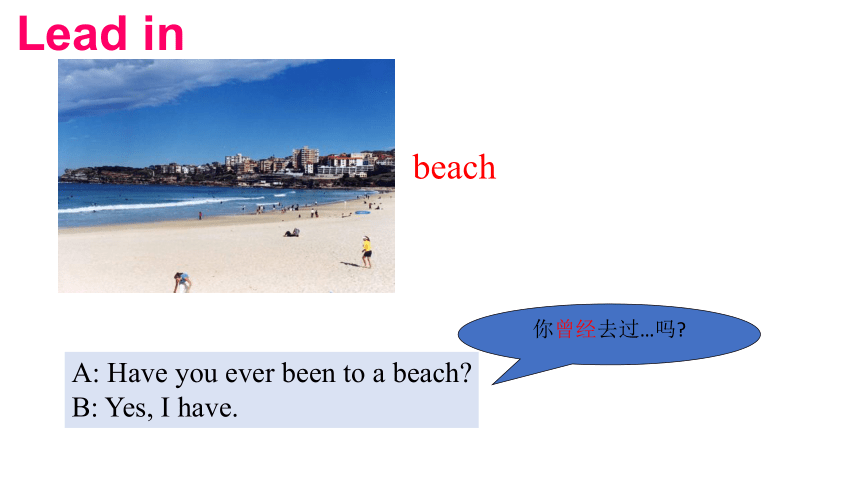
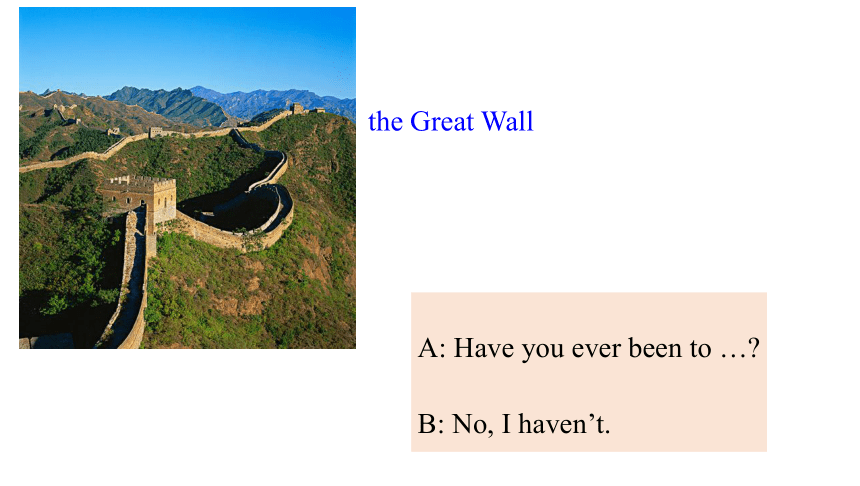
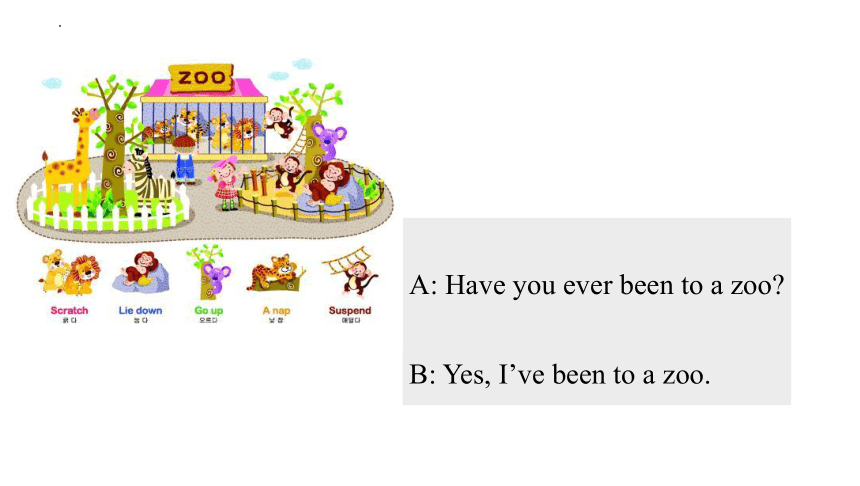
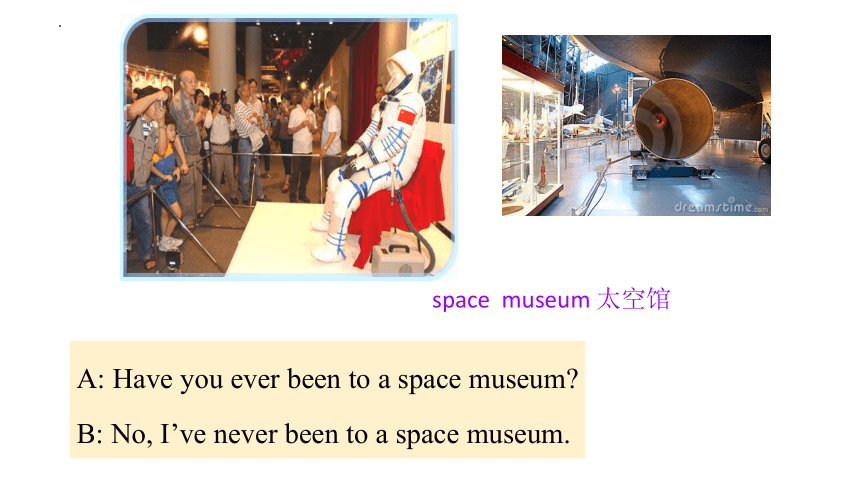

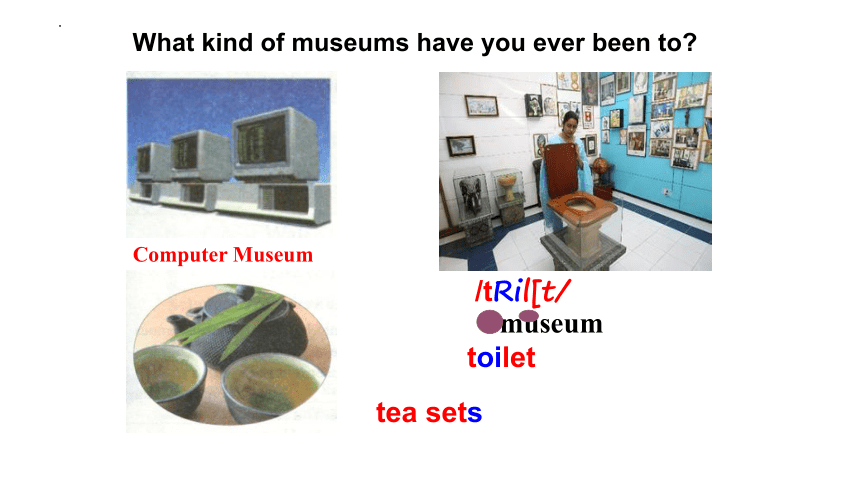
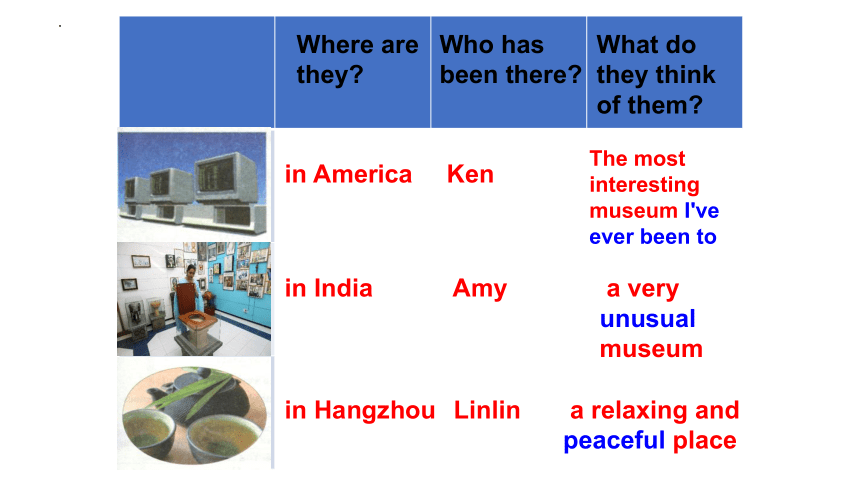
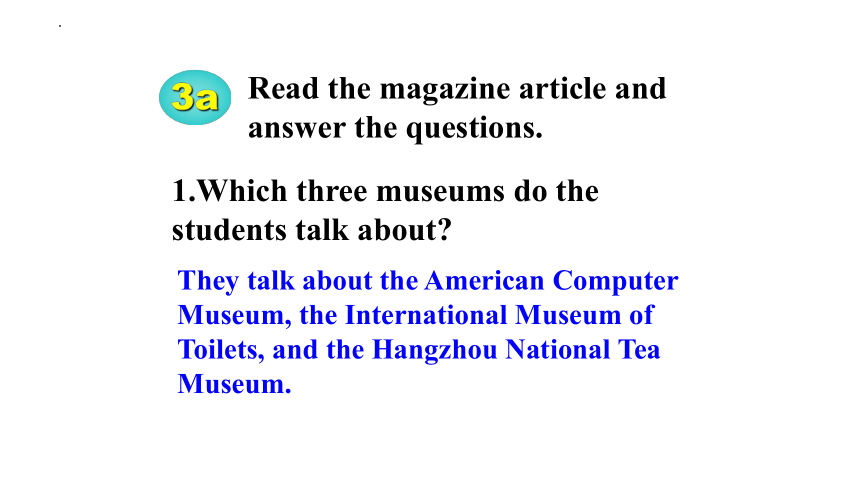
文档简介
(共24张PPT)
Section A(3a~3c)
Unit 9
Have you ever been to a museum
A: Have you ever been to a beach
B: Yes, I have.
你曾经去过…吗
Lead in
beach
the Great Wall
A: Have you ever been to …
B: No, I haven’t.
A: Have you ever been to a zoo
B: Yes, I’ve been to a zoo.
space museum 太空馆
A: Have you ever been to a space museum
B: No, I’ve never been to a space museum.
Do you /k[lekt/ /stAmps/
collect
stamps
What kind of museums have you ever been to
Computer Museum
/tRil[t/ museum
toilet
tea sets
Where are they
in America
in India
in Hangzhou
Who has been there
Ken
Amy
Linlin
What do they think of them
The most interesting museum I've ever been to
a very unusual museum
a relaxing and peaceful place
3a
Read the magazine article and answer the questions.
1.Which three museums do the students talk about
They talk about the American Computer Museum, the International Museum of Toilets, and the Hangzhou National Tea Museum.
2. What do you think is the most interesting thing about each museum
the American Computer Museum - the special computer that can play chess even better than humans. the International Museum of Toilets – many different kinds of toilets. the Hangzhou National Tea Museum – the tea art performances.
Who __________ them.
The old computers are __________.
The new computers are ___________.
A special computer could __________ even better than humans.
Information about the computer museum
invented
much bigger
much smaller
unbelieveable
Because technology has progressed in such a rapid way.
= become better
=quick
play chess
How did the writer feel when she saw so many kinds of toilets there
What are the main purposes(目的) of this museum
Information about the toilet museum
She couldn't believe her eyes.
It teaches people about the history and development of toilets.
It also encourages (鼓励) governments and social group to think about ways to improve toilets in the future.
The tea museum is near a lake.
The tea art performances show us how to make a cup of perfect tea well.
Watching the tea preparation is less enjoyable than drinking the tea itself.
Linlin still can't understand why her grandpa collects tea sets.
Information about the tea museum
T
T
F
F
Have you ever watched the tea art performances
3c. Which of the underlined words in the passage have the following meanings
make (something) better
become better uncommon
Quiet
made
quick
improve
progress
unusual
peaceful
invent
rapid
Have you ever been to a museum
1.ever:表示曾经,一般用于现在完成时的一般疑问句中
2.have/has been to+地点名词,表示某人曾经去过某地,指过去曾去过,而现在并不在那里,在一般疑问句中,中间常常用ever, 所表达的意思一样。
陈述句:主语+have/has been to +地点名词
一般疑问句:have/has +主语 +been to+地点名词
肯定回答:Yes, I have.
否定回答: No, I haven't
例1. 我曾经去过历史博物馆。
I have been to the history museum.
例2. 李明曾经去过北京吗?
Has Liming ever been to Beijing
肯定回答:Yes, he has.
否定回答: No, he hasn't.
例3.你曾经去过那儿吗?
Have you ever been there
注意:当have been to 后面接的地点名词是there,here,home 这些副词是,to要去掉
have been to,have gone to以及have been in 的区别:
He has ever been to Shanghai three times.
He has gone to Shanhai and he will come back soon.
He has been in Shanghai for three yeas.
他曾经去过上海三次
他到上海去了但是他很快就会回来了
他在上海呆了三年
has been to 表示去过某地,已经回来了,后面可接次数
has gone to表示到某处去了,现在还没回来,可能在那里或在去的途中
has been in 表示在某处呆过多长时间,后面常加时间段,
Practice:
1.I ________________space museum four times.
2. Lisa_________________her hometown and she will come back two days later.
3.He_________________Xi'an for three years.
have been to
has gone to
has been in
somewhere adv.;在某处,在某地
1.some+where 构成的复合名词,类似的词有 anywhere,nowhere
2.当形容词修饰它的时候,形容词要后置
e.g:somewhere different
somewhere cool
somewhere interesting
3.通常用于肯定句中,在否定句中用anywhere
e.g I want to go somewhere interesting
She couldn't fiind her book anywhere.
Me too: 相当于So+助动词/情态动词/be+主语,表示说话者的情况与上述肯定句中所说的话的内容一样
A:I can do all kinds of sports.
B:Me too./ So can I.
A: I haven't been to Beijing
B: Me neither/ Neither have I.
拓展:neither常与nor构成并列连词neither...nor... ,表示既不...也不...,在连接两个主语时谓语动词要和邻近的主语一致
e.g: Neither I nor he knows the man.
Neither he nor I know the man.
Me neither
相当于Neither+助动词/情态动词/be+主语,表示说话者的情况与上述否定句中所说的话的内容一样
Ⅰ 根据句意及首字母提示完成单词。
1.This is a p______ tea set and I like it very much.
2.I c_______ some storybooks for you last week
3.He studies hard and makes p_______ every day.
4.Is this your country’ s most serious s_______ problem .She had a strong will and power of r_______ decision.
erfect
ollected
rogress
ocial
apid
Ⅱ 从方框中选词并用其适当形式填空。
believe, it, perform, usual, toilet
6. I moved into a new house with three bedrooms and two __________.
7. She is a very __________ woman,one of a kind.
8.I think his____________is the best one in the show.
9.It will be several months before the young bird can feed __________.
10. It’s ___________ that he has been independent now under his mom’ s over protection.
toilets
unusual
performance
itself
unbelievable
Ⅲ 单项选择。
11. What ___ unusual school trip we had! I will never forget it.
A.a B.an C.the D./
12.Ted’ s father is a famous ___. He many modern tools so far
A.invention;invents B.inventor;has invented
C.invention;invented D.inventor;invents
13. The new year is coming. Teachers encourage us ___ new hobbies.
A.develop B.developing C.to develop D.developed
B
B
C
14.—I hear your uncle and aunt have moved to the countryside.
—Yes. They think the life in the countryside is more ___.
A.similar B.boring C.peaceful D.crowded
15. Watching the girls prepare the tea ___ as ___ as drinking tea itself.
A.are;enjoyable B.is;enjoyable
C.is;more enjoyable D.are;more enjoyable
16.— Bi Sheng, an ancient Chinese, ___ movable type printing in the 1040s.
—It was developed in China but served the world.
A.invented B.caused C.improved D.searched
C
B
A
Section A(3a~3c)
Unit 9
Have you ever been to a museum
A: Have you ever been to a beach
B: Yes, I have.
你曾经去过…吗
Lead in
beach
the Great Wall
A: Have you ever been to …
B: No, I haven’t.
A: Have you ever been to a zoo
B: Yes, I’ve been to a zoo.
space museum 太空馆
A: Have you ever been to a space museum
B: No, I’ve never been to a space museum.
Do you /k[lekt/ /stAmps/
collect
stamps
What kind of museums have you ever been to
Computer Museum
/tRil[t/ museum
toilet
tea sets
Where are they
in America
in India
in Hangzhou
Who has been there
Ken
Amy
Linlin
What do they think of them
The most interesting museum I've ever been to
a very unusual museum
a relaxing and peaceful place
3a
Read the magazine article and answer the questions.
1.Which three museums do the students talk about
They talk about the American Computer Museum, the International Museum of Toilets, and the Hangzhou National Tea Museum.
2. What do you think is the most interesting thing about each museum
the American Computer Museum - the special computer that can play chess even better than humans. the International Museum of Toilets – many different kinds of toilets. the Hangzhou National Tea Museum – the tea art performances.
Who __________ them.
The old computers are __________.
The new computers are ___________.
A special computer could __________ even better than humans.
Information about the computer museum
invented
much bigger
much smaller
unbelieveable
Because technology has progressed in such a rapid way.
= become better
=quick
play chess
How did the writer feel when she saw so many kinds of toilets there
What are the main purposes(目的) of this museum
Information about the toilet museum
She couldn't believe her eyes.
It teaches people about the history and development of toilets.
It also encourages (鼓励) governments and social group to think about ways to improve toilets in the future.
The tea museum is near a lake.
The tea art performances show us how to make a cup of perfect tea well.
Watching the tea preparation is less enjoyable than drinking the tea itself.
Linlin still can't understand why her grandpa collects tea sets.
Information about the tea museum
T
T
F
F
Have you ever watched the tea art performances
3c. Which of the underlined words in the passage have the following meanings
make (something) better
become better uncommon
Quiet
made
quick
improve
progress
unusual
peaceful
invent
rapid
Have you ever been to a museum
1.ever:表示曾经,一般用于现在完成时的一般疑问句中
2.have/has been to+地点名词,表示某人曾经去过某地,指过去曾去过,而现在并不在那里,在一般疑问句中,中间常常用ever, 所表达的意思一样。
陈述句:主语+have/has been to +地点名词
一般疑问句:have/has +主语 +been to+地点名词
肯定回答:Yes, I have.
否定回答: No, I haven't
例1. 我曾经去过历史博物馆。
I have been to the history museum.
例2. 李明曾经去过北京吗?
Has Liming ever been to Beijing
肯定回答:Yes, he has.
否定回答: No, he hasn't.
例3.你曾经去过那儿吗?
Have you ever been there
注意:当have been to 后面接的地点名词是there,here,home 这些副词是,to要去掉
have been to,have gone to以及have been in 的区别:
He has ever been to Shanghai three times.
He has gone to Shanhai and he will come back soon.
He has been in Shanghai for three yeas.
他曾经去过上海三次
他到上海去了但是他很快就会回来了
他在上海呆了三年
has been to 表示去过某地,已经回来了,后面可接次数
has gone to表示到某处去了,现在还没回来,可能在那里或在去的途中
has been in 表示在某处呆过多长时间,后面常加时间段,
Practice:
1.I ________________space museum four times.
2. Lisa_________________her hometown and she will come back two days later.
3.He_________________Xi'an for three years.
have been to
has gone to
has been in
somewhere adv.;在某处,在某地
1.some+where 构成的复合名词,类似的词有 anywhere,nowhere
2.当形容词修饰它的时候,形容词要后置
e.g:somewhere different
somewhere cool
somewhere interesting
3.通常用于肯定句中,在否定句中用anywhere
e.g I want to go somewhere interesting
She couldn't fiind her book anywhere.
Me too: 相当于So+助动词/情态动词/be+主语,表示说话者的情况与上述肯定句中所说的话的内容一样
A:I can do all kinds of sports.
B:Me too./ So can I.
A: I haven't been to Beijing
B: Me neither/ Neither have I.
拓展:neither常与nor构成并列连词neither...nor... ,表示既不...也不...,在连接两个主语时谓语动词要和邻近的主语一致
e.g: Neither I nor he knows the man.
Neither he nor I know the man.
Me neither
相当于Neither+助动词/情态动词/be+主语,表示说话者的情况与上述否定句中所说的话的内容一样
Ⅰ 根据句意及首字母提示完成单词。
1.This is a p______ tea set and I like it very much.
2.I c_______ some storybooks for you last week
3.He studies hard and makes p_______ every day.
4.Is this your country’ s most serious s_______ problem .She had a strong will and power of r_______ decision.
erfect
ollected
rogress
ocial
apid
Ⅱ 从方框中选词并用其适当形式填空。
believe, it, perform, usual, toilet
6. I moved into a new house with three bedrooms and two __________.
7. She is a very __________ woman,one of a kind.
8.I think his____________is the best one in the show.
9.It will be several months before the young bird can feed __________.
10. It’s ___________ that he has been independent now under his mom’ s over protection.
toilets
unusual
performance
itself
unbelievable
Ⅲ 单项选择。
11. What ___ unusual school trip we had! I will never forget it.
A.a B.an C.the D./
12.Ted’ s father is a famous ___. He many modern tools so far
A.invention;invents B.inventor;has invented
C.invention;invented D.inventor;invents
13. The new year is coming. Teachers encourage us ___ new hobbies.
A.develop B.developing C.to develop D.developed
B
B
C
14.—I hear your uncle and aunt have moved to the countryside.
—Yes. They think the life in the countryside is more ___.
A.similar B.boring C.peaceful D.crowded
15. Watching the girls prepare the tea ___ as ___ as drinking tea itself.
A.are;enjoyable B.is;enjoyable
C.is;more enjoyable D.are;more enjoyable
16.— Bi Sheng, an ancient Chinese, ___ movable type printing in the 1040s.
—It was developed in China but served the world.
A.invented B.caused C.improved D.searched
C
B
A
同课章节目录
- Unit 1 What's the matter?
- Section A
- Section B
- Unit 2 I'll help to clean up the city parks.
- Section A
- Section B
- Unit 3 Could you please clean your room?
- Section A
- Section B
- Unit 4 Why don't you talk to your parents?
- Section A
- Section B
- Unit 5 What were you doing when the rainstorm came
- Section A
- Section B
- Review of Units 1-5
- Unit 6 An old man tried to move the mountains.
- Section A
- Section B
- Unit 7 What's the highest mountain in the world?
- Section A
- Section B
- Unit 8 Have you read Treasure Island yet?
- Section A
- Section B
- Unit 9 Have you ever been to a museum?
- Section A
- Section B
- Unit 10 I've had this bike for three years.
- Section A
- Section B
